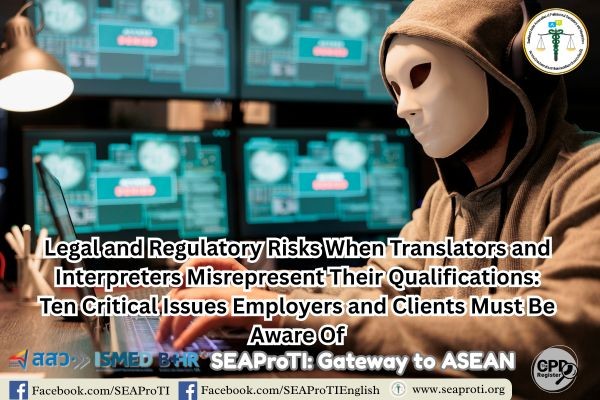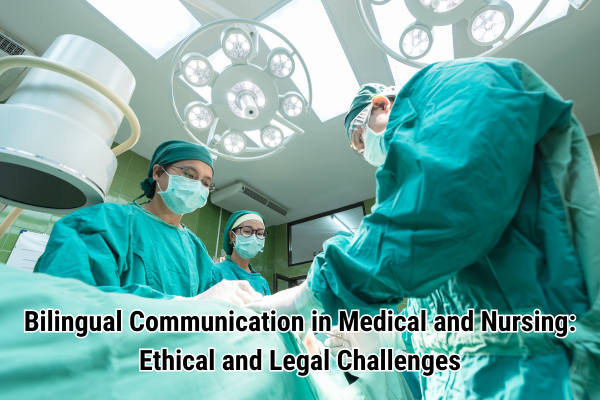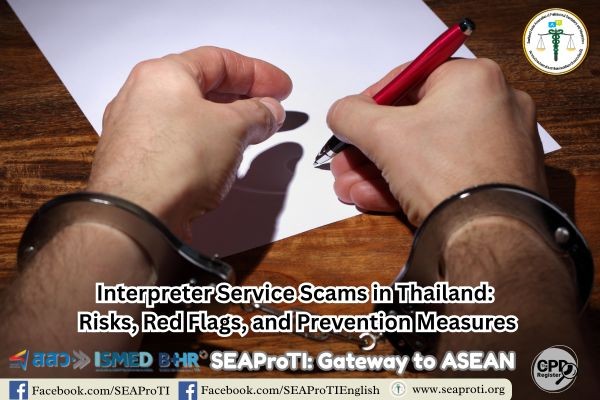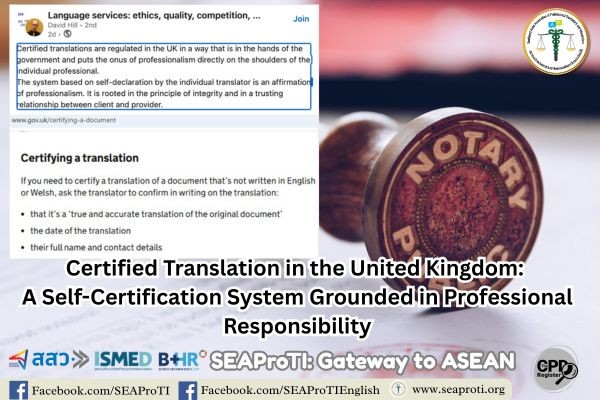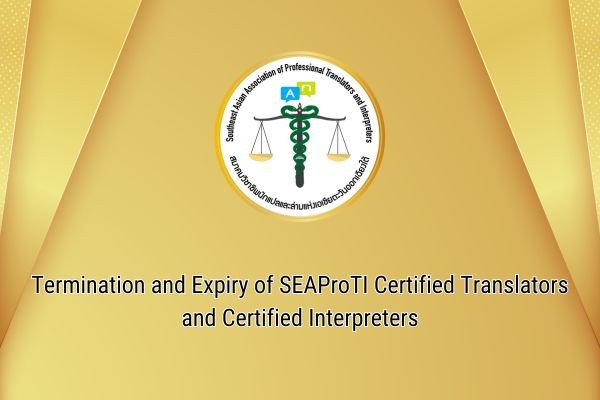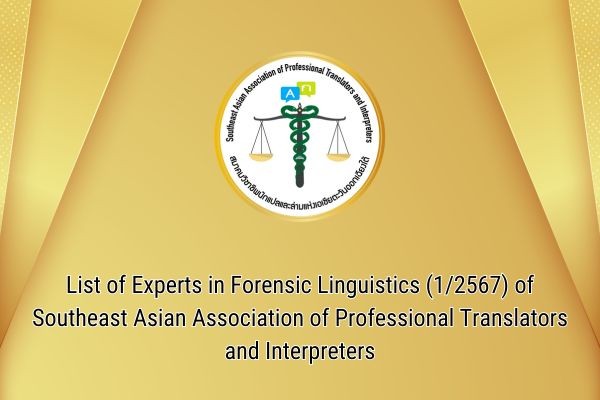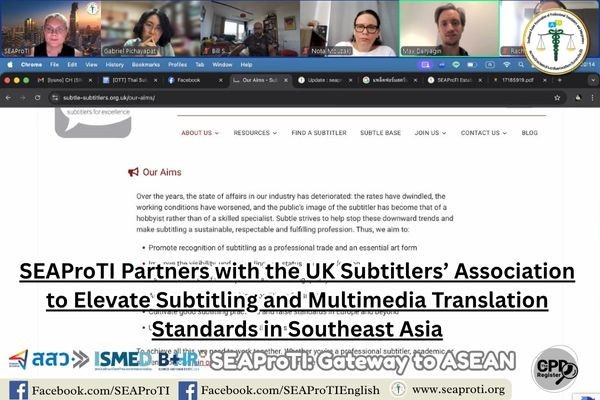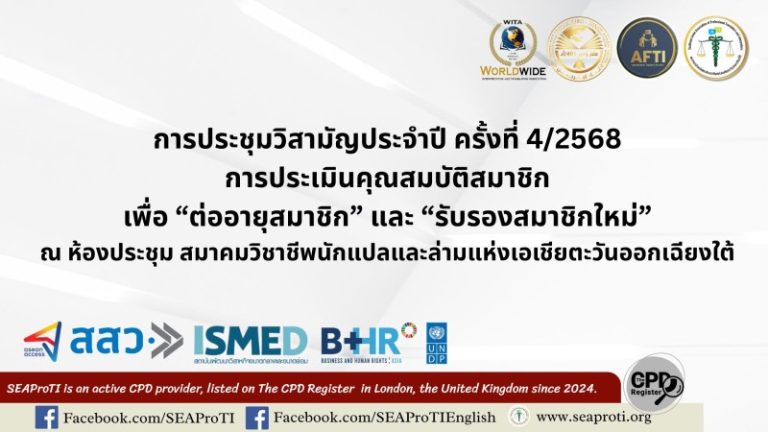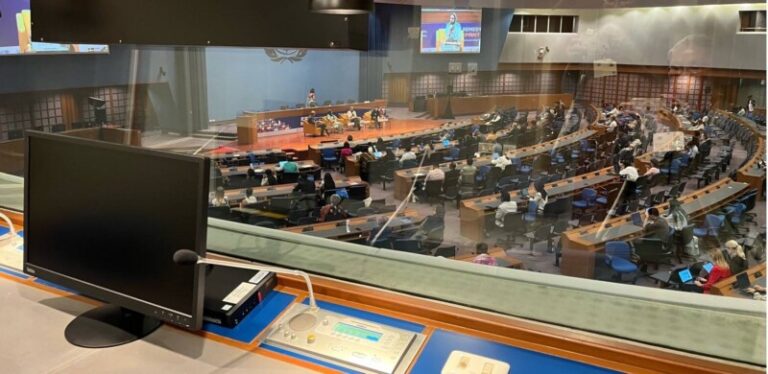Legal and Regulatory Risks When Translators and Interpreters Misrepresent Their Qualifications:
Ten Critical Issues Employers and Clients Must Be Aware Of
17 November 2025, Bangkok – The translation and interpreting industry in Thailand has expanded rapidly; however, it continues to face significant problems including credential misrepresentation, the use of forged licenses, unauthorized certification of documents, and violations of relevant laws such as the Act in judicial proceedings, consular legalization regulations, the Personal Data Protection Act (PDPA), and criminal law concerning forged documents. This article identifies ten key risks that employers and service users must consider when engaging translators and interpreters who misrepresent their qualifications. The discussion integrates legal frameworks, professional standards, and empirical findings to support risk mitigation in legal, commercial, and data-security contexts.
Legal Liability Arising from Forged Documents and False Certification
Using translators who are not legally authorized to certify documents may result in the rejection of such documents by courts, government agencies, or foreign embassies. Under Sections 264–268 of the Thai Criminal Code, both the forger and the user of forged documents may incur criminal liability (Office of the Council of State, 2023).
Material Damage Resulting from Errors in Legal or Contractual Translation
Research in legal translation demonstrates that seemingly minor translation errors in contracts, judgments, and statutory texts can result in substantial legal and financial consequences (Cao, 2007). The risks increase significantly when the translator lacks proper training or professional licensing.
PDPA Violations Due to Uploading Confidential Files to Unapproved AI Platforms
Unqualified translators commonly upload client documents to AI or cloud-based tools without the required consent, risking non-compliance with Section 37 of the PDPA. Organizations may face administrative fines up to five million baht (Personal Data Protection Committee, 2022).
Unauthorized Access to Confidential Information without Adequate Security Measures
Interpreting and translation in legal, financial, diplomatic, and medical settings require strict confidentiality standards such as need-to-know access, encryption, and secure file transfer protocols aligned with ISO 27001. Individuals who misrepresent credentials typically lack such systems, increasing the risk of data breaches (AIIC, 2018).
False Claims of “Worldwide Validity” in Translation Certification
Document certification is regulated by specific legal requirements, including acceptance standards set by the Department of Consular Affairs and by foreign embassies. Misrepresentation that a translator’s certification is “valid worldwide” can result in document rejection and substantial additional costs (Ministry of Foreign Affairs, 2024).
Use of Forged Professional Seals or Fraudulent Membership Certificates
The use of fake association seals or fabricated licenses constitutes a criminal offense. Employers may be investigated as users of forged documents even if they were unaware of the falsification (Supreme Court of Thailand, 2021).
Tax and Accounting Risks Due to Improper Invoicing Practices
Unlicensed service providers often fail to issue tax invoices or use another person’s identity for billing. This prevents companies from claiming expenses and may result in retrospective tax assessments by the Revenue Department (Revenue Department, 2023).
High Risk of Project Abandonment or Non-Performance
Professional associations such as SEAProTI, NAATI, and ATA report significantly higher rates of missed deadlines, client abandonment, and quality failures among unlicensed providers compared to certified professionals (ATA, 2022). Such failures can disrupt judicial proceedings and business operations.
Unauthorized Court or Government Interpreting May Void Testimony
The Thai Supreme Court has ruled that investigative procedures or courtroom testimony may be invalid if conducted with interpreters who do not meet legal qualifications (Supreme Court Judgment 2050/2566; 3114/2566). This creates substantial legal risk for employers who engage unauthorized interpreters.
Employer Liability for Supporting Misrepresentation or Use of Illegal Services
If a translator or interpreter falsely claims to be a “licensed professional” and the employer relies on their services, the employer may face allegations of using or supporting forged documentation under Thai criminal law—even without direct intent (Office of the Attorney General, 2022).
Conclusion
Engaging translators and interpreters who misrepresent their qualifications presents systemic risks—legal, financial, regulatory, and operational. Professional certification, such as licensing under SEAProTI or internationally recognized credentials, is therefore essential for quality assurance and compliance. Employers and institutions should implement due diligence processes, including credential verification, NDAs, secure data handling, and documentation audit trails, to mitigate risks in high-stakes environments.
- AIIC. (2018). Code of professional ethics. International Association of Conference Interpreters.
- American Translators Association. (2022). ATA compensation & standards report. ATA Publications.
- Cao, D. (2007). Translating law. Multilingual Matters.
- Ministry of Foreign Affairs. (2024). Consular legalization and translation requirements. Department of Consular Affairs.
- Office of the Attorney General. (2022). Criminal liability in document offenses. OAG Legal Bulletin.
- Office of the Council of State. (2023). Thai Criminal Code: Section 264–268. Government Gazette.
- Personal Data Protection Committee. (2022). Guidelines for data processors under PDPA. PDPC Thailand.
- Revenue Department. (2023). Tax compliance handbook for service businesses. Ministry of Finance.
- Supreme Court of Thailand. (2021). Judgment on forged certifications.
- Supreme Court of Thailand. (2023). Judgment No. 2050/2566.
- Supreme Court of Thailand. (2023). Judgment No. 3114/2566.
The Southeast Asian Association of Professional Translators and Interpreters (SEAProTI) has formally announced the qualifications and requirements for registration of Certified Translators, Translation Certification Providers, and Certified Interpreters in Sections 9 and 10 of the Royal Gazette, published by the Secretariat of the Cabinet, Office of the Prime Minister of Thailand, on 25 July 2024 (Vol. 141, Part 66 Ng, p. 100). Certified Translators, Translation Certification Providers, and Certified Interpreters
The Council of State has proposed the enactment of a Royal Decree, granting registered translators and recognized translation certifiers from professional associations or accredited language institutions the authority to provide legally valid translation certification (Letter to SEAProTI dated April 28, 2025)
SEAProTI is the first professional association in Thailand and Southeast Asia to implement a comprehensive certification system for translators, certifiers, and interpreters.
Head Office: Baan Ratchakru Building, No. 33, Room 402, Soi Phahonyothin 5, Phahonyothin Road, Phaya Thai District, Bangkok 10400, Thailand
Email: hello@seaproti.com | Tel.: (+66) 2-114-3128 (Office hours: Mon–Fri, 09:00–17:00)
ความเสี่ยงทางกฎหมายและการกำกับดูแล เมื่อผู้ให้บริการแปลและล่ามแอบอ้างคุณสมบัติ: 10 ประเด็นที่นายจ้างและผู้ใช้บริการต้องระวัง
17 พฤศจิกายน 2568, กรุงเทพมหานคร – อุตสาหกรรมการแปลและการล่ามในประเทศไทยเติบโตอย่างรวดเร็ว แต่ยังเผชิญปัญหาสำคัญคือการแอบอ้างคุณสมบัติ การใช้ใบอนุญาตปลอม การรับรองเอกสารโดยบุคคลไร้สิทธิ รวมถึงการละเมิดกฎหมายที่เกี่ยวข้อง เช่น พ.ร.บ. ในกระบวนการยุติธรรม มาตรฐานการรับรองเอกสารของกรมการกงสุล กฎหมาย PDPA และกฎหมายอาญาเกี่ยวกับเอกสารเท็จ บทความนี้นำเสนอ 10 ประเด็นที่ผู้ว่าจ้างและผู้ใช้บริการต้องระวัง เพื่อเป็นแนวทางในการลดความเสี่ยงด้านกฎหมาย การเงิน และความปลอดภัยสารสนเทศ พร้อมเสนอข้อมูลตามหลักฐานเชิงนโยบายและงานศึกษาที่เกี่ยวข้อง
ความรับผิดทางกฎหมายจากเอกสารปลอมและการรับรองเท็จ
การใช้ผู้แปลที่ไม่มีอำนาจรับรองเอกสารอาจส่งผลให้เอกสารถูกปฏิเสธจากศาล หน่วยงานรัฐ หรือสถานทูตต่างประเทศ และอาจเข้าข่ายความผิดตามประมวลกฎหมายอาญา มาตรา 264–268 ซึ่งลงโทษทั้งผู้ปลอมและผู้ใช้เอกสารปลอม (Office of the Council of State, 2023)
ความเสียหายจากการแปลผิดสาระสำคัญในเอกสารกฎหมาย/สัญญา
งานวิจัยด้านการแปลกฎหมายชี้ว่า ความผิดพลาดเพียงเล็กน้อยในสัญญาหรือคำพิพากษาอาจนำไปสู่การเสียสิทธิหรือข้อพิพาทมูลค่ามหาศาล (Cao, 2007) การใช้ผู้ไม่มีคุณสมบัติทำให้ความเสี่ยงยิ่งเพิ่มขึ้น
ความเสี่ยงด้านการละเมิด PDPA จากการส่งไฟล์เข้า AI หรือระบบที่ไม่ได้รับอนุญาต
ผู้แปลที่ไม่มีมาตรฐานวิชาชีพมักใช้แพลตฟอร์ม AI โดยไม่ได้ขอความยินยอมจากเจ้าของข้อมูล ซึ่งอาจเข้าข่ายละเมิด PDPA มาตรา 37 (Personal Data Protection Committee, 2022) ส่งผลให้นิติบุคคลถูกปรับสูงถึง 5 ล้านบาท
การเข้าถึงข้อมูลลับโดยไม่มีมาตรการความปลอดภัย
การล่ามและแปลในงานด้านกฎหมาย การเงิน และการแพทย์ต้องมีมาตรฐานความปลอดภัย ตามหลัก need-to-know และการเข้ารหัสข้อมูล (ISO 27001) แต่ผู้ให้บริการที่แอบอ้างมักไม่มีระบบเหล่านี้ ทำให้ข้อมูลลับเสี่ยงต่อการรั่วไหลและละเมิดจริยธรรม (AIIC, 2018)
การอ้างว่ารับรองได้ทั่วโลกโดยไม่เป็นจริง
การรับรองเอกสารมีกรอบกฎหมายเฉพาะ เช่น การรับรองโดยผู้แปลที่กรมการกงสุลยอมรับ หรือผู้ถือใบอนุญาตจากองค์กรวิชาชีพที่มีมาตรฐาน หากผู้แปลแอบอ้างว่าสามารถ “ใช้ได้ทั่วโลก” โดยไม่มีหลักฐาน อาจทำให้เอกสารถูกปฏิเสธและเกิดค่าใช้จ่ายซ้ำซ้อน (Ministry of Foreign Affairs, 2024)
การใช้ตราประทับหรือใบอนุญาตปลอมของสมาคม/หน่วยงานรัฐ
การปลอมตรารับรองหรือใบอนุญาตถือเป็นความผิดอาญา และส่งผลให้นายจ้างถูกตรวจสอบฐานะผู้ใช้เอกสารปลอมด้วย แม้กระทั่งกรณีที่นายจ้าง “ไม่รู้” (Supreme Court of Thailand, 2021)
การออกเอกสารทางบัญชีที่ไม่ถูกต้องและเสี่ยงภาษี
ผู้แปลที่ผิดกฎหมายมักไม่ออกใบกำกับภาษีหรือใช้ชื่อบุคคลอื่น ทำให้นิติบุคคลไม่สามารถนำค่าใช้จ่ายไปหักภาษีและเสี่ยงถูกประเมินย้อนหลังจากกรมสรรพากร (Revenue Department, 2023)
ความเสี่ยงในการทิ้งงานหรือผิดนัด เนื่องจากไม่มีมาตรฐานวิชาชีพกำกับ
สมาคมวิชาชีพ เช่น SEAProTI, NAATI, ATA พบว่าผู้ให้บริการที่ไม่มีใบอนุญาตมีอัตราการทิ้งงานหรือส่งงานล่าช้าสูงกว่าผู้ได้รับการรับรองหลายเท่า (ATA, 2022) สร้างความเสียหายต่อองค์กรและกระบวนการยุติธรรม
การล่ามในศาลหรือราชการโดยไม่มีสิทธิ ทำให้คำให้การเป็นโมฆะ
ศาลฎีกาไทยวินิจฉัยหลายคดีว่า การไม่มีล่ามที่ถูกต้องตามกฎหมายอาจทำให้กระบวนการสอบสวนหรือคำให้การเป็นโมฆะ (Supreme Court Judgment 2050/2566; 3114/2566) จึงเป็นความเสี่ยงสูงสำหรับนายจ้างที่เลือกผู้ไม่มีคุณสมบัติ
ผู้ว่าจ้างอาจมีส่วนร่วมในความผิด หากเลือกผู้ให้บริการที่ “แอบอ้าง”
หากผู้ให้บริการแอบอ้างว่าเป็น “นักแปลรับรอง–ล่ามรับรอง” ทั้งที่ไม่มีสิทธิ และนายจ้างนำเอกสารไปใช้ อาจเข้าข่ายผู้สนับสนุนหรือผู้ใช้เอกสารปลอมตามกฎหมายอาญา แม้จะไม่มีเจตนาโดยตรง (Office of the Attorney General, 2022)
สรุป
การว่าจ้างนักแปลและล่ามที่แอบอ้างคุณสมบัติ ไม่เพียงเป็นความเสี่ยงต่อคุณภาพของงาน แต่ยังเป็นความเสี่ยงเชิงกฎหมาย ภาษี ความปลอดภัยข้อมูล และความชอบด้วยกฎหมายในกระบวนการยุติธรรม การเลือกผู้ให้บริการที่ผ่านการรับรองตามมาตรฐาน เช่น ใบอนุญาตของ SEAProTI หรือมาตรฐานต่างประเทศ จึงเป็นส่วนสำคัญในการป้องกันปัญหาเชิงโครงสร้างและเสริมสร้างความเชื่อมั่นของสถาบันในประเทศไทย
รายการอ้างอิง
- AIIC. (2018). Code of professional ethics. International Association of Conference Interpreters.
- American Translators Association. (2022). ATA compensation & standards report. ATA Publications.
- Cao, D. (2007). Translating law. Multilingual Matters.
- Ministry of Foreign Affairs. (2024). Consular legalization and translation requirements. Department of Consular Affairs.
- Office of the Attorney General. (2022). Criminal liability in document offenses. OAG Legal Bulletin.
- Office of the Council of State. (2023). Thai Criminal Code: Section 264–268. Government Gazette.
- Personal Data Protection Committee. (2022). Guidelines for data processors under PDPA. PDPC Thailand.
- Revenue Department. (2023). Tax compliance handbook for service businesses. Ministry of Finance.
- Supreme Court of Thailand. (2021). Judgment on forged certifications.
- Supreme Court of Thailand. (2023). Judgment No. 2050/2566.
- Supreme Court of Thailand. (2023). Judgment No. 3114/2566.
สมาคมวิชาชีพนักแปลและล่ามแห่งเอเชียตะวันออกเฉียงใต้ (SEAProTI) ได้ประกาศหลักเกณฑ์และคุณสมบัติผู้ที่ขึ้นทะเบียนเป็น “นักแปลรับรอง (Certified Translators) และผู้รับรองการแปล (Translation Certification Providers) และล่ามรับรอง (Certified Interpreters)” ของสมาคม หมวดที่ 9 และหมวดที่ 10 ในราชกิจจานุเบกษา ของสำนักเลขาธิการคณะรัฐมนตรี ในสำนักนายกรัฐมนตรี แห่งราชอาณาจักรไทย ลงวันที่ 25 ก.ค. 2567 เล่มที่ 141 ตอนที่ 66 ง หน้า 100 อ่านฉบับเต็มได้ที่: นักแปลรับรอง ผู้รับรองการแปล และล่ามรับรอง
สำนักคณะกรรมการกฤษฎีกาเสนอให้ตราเป็นพระราชกฤษฎีกา โดยกำหนดให้นักแปลที่ขึ้นทะเบียน รวมถึงผู้รับรองการแปลจากสมาคมวิชาชีพหรือสถาบันสอนภาษาที่มีการอบรมและขึ้นทะเบียน สามารถรับรองคำแปหฟลได้ (จดหมายถึงสมาคม SEAProTI ลงวันที่ 28 เม.ย. 2568)
สมาคมวิชาชีพนักแปลและล่ามแห่งเอเชียตะวันออกเฉียงใต้ เป็นสมาคมวิชาชีพแห่งแรกในประเทศไทยและภูมิภาคเอเชียตะวันออกเฉียงใต้ที่มีระบบรับรองนักแปลรับรอง ผู้รับรองการแปล และล่ามรับรอง
สำนักงานใหญ่: อาคารบ้านราชครู เลขที่ 33 ห้อง 402 ซอยพหลโยธิน 5 ถนนพหลโยธิน แขวงพญาไท เขตพญาไท กรุงเทพมหานคร 10400 ประเทศไทย
อีเมล: hello@seaproti.com โทรศัพท์: (+66) 2-114-3128 (เวลาทำการ: วันจันทร์–วันศุกร์ เวลา 09.00–17.00 น.


